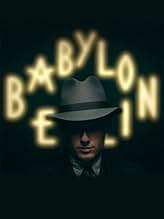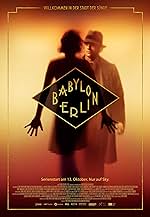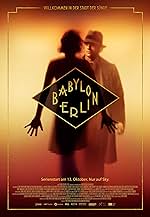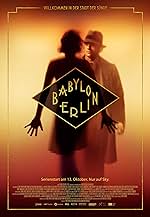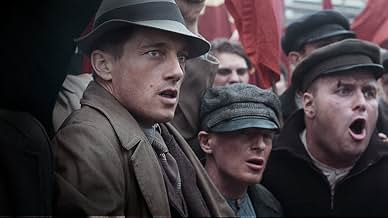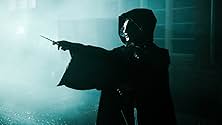Le commissaire Gereon Rath, originaire de Cologne, s'installe à Berlin, l'épicentre des changements politiques et sociaux survenus dans les années folles.Le commissaire Gereon Rath, originaire de Cologne, s'installe à Berlin, l'épicentre des changements politiques et sociaux survenus dans les années folles.Le commissaire Gereon Rath, originaire de Cologne, s'installe à Berlin, l'épicentre des changements politiques et sociaux survenus dans les années folles.
- Prix
- 25 victoires et 19 nominations au total
Parcourir les épisodes
Histoire
Le saviez-vous
- AnecdotesThe door-less elevators at the Berlin police headquarters are what is known as a "Paternoster lift". The lift consists of a continuously moving loop of low-speed elevator cars, one half moving up while the other half moves down. Common in European buildings prior to World War II, a large number of these have been preserved in Germany. Most surviving lifts are however no longer in general use due to their obvious safety issues.
- GaffesThe fact that the gold in the train was really coal painted gold would have been discovered much earlier when the fake gold was loaded on the train because the weight would have been much less than real gold.
- ConnexionsFeatured in Babylon Berlin in Concert (2023)
- Bandes originalesBabylon Berlin
By Johnny Klimek & Tom Tykwer
Commentaire en vedette
This series are one of the best I've ever seen. First of all because they are educational. They tell us about how life was under the Weimar Republic (the democratic regime in Germany between 1919 and 1933). I am tired of all those cliches about Germany as fascistland, ignoring the rich history this country had before authoritarianism.
In Germany 1929, the country is falling apart because of the great depression combined with the crippling punishment of Versailles treaty, plus almost all adult males are crippled because of WWI or heavily shell shocked, with seizures and convilsions that prevented them of working or actually leading normal lives. Starvation, homelessness, drug use and prostitition (male, female and transvestite ) are essentially the only way many families resort in order to feed their children and older relatives. Heroin addiction is a menace, and that despair is driving people to embrace any charlatan, demagogue or ideology that promises bringing them a better future (which at the time, was not fascim yet, but Bolshevism, with Trotskyists and Stalinist competing and fighting each other).
Despite all that hopelessness and misery that Germans were enduring, there is an incredible cultural scene happening in Berlin, where the nightlife is intense, American Jazz musicians and dancers achieve success, the arts (Cinema, design, architecture, music) is evolving, there is a lot of beauty and reckless sex happening. Decadence is the word to describe the atmosphere, where a caste society lives another planet, with country clubs, mansions and servants, while the plight of the majority is simply ignored. It almost feel like the Blade Runner society.
It is not mentioned in the series, but at the time, Albert Einstein was a professor in Berlin, and Fritz Lang was the king of Cinema, Walter Gropius founded Bauhaus by that time, Vladimir Nabokov was living there, in short, the great Europeans minds flocked to Berlin in the late 1920s. So what you appreciate in the series is this dicotomy. How a society with so much brilliance, talent and efficiency could have rebuild itself slowly and become a prosperous nation, but later the population made wrong choices and followed the call that ended up in a disaster that they will never recover. I was in Berlin 2 tears ago, and saw how damaged the city is and felt so sorry for them and their curse.
The series gives us some contex that help us understand how many people, mostly good intentioned, ended up supporting a system in 1933 that was almost non existent in the 20s (fascism). Their regime at the time was democratic, with a free press, a legal system, parliament, etc.
Babylon Berlin is not only politics. It is also thriller, romance, drama and action. The main actors Gereon and Lotte are very charismatic and you cheer for them all the time, because they come from disfunctional families, but they try to do the right thing all the time. It is almos impossible not to fall in love with Lotte.
The rest of the cast is also very good looking, but still keeping the beauty standars accurate with the early 20th century. Their nude bodies are beautiful, but never arousing. The nakedness is constant, but never out of place. And people smoke all the time, whic is also accurate. There is almost no scene without a cigarette.
I hope most people enjoy just like I did
In Germany 1929, the country is falling apart because of the great depression combined with the crippling punishment of Versailles treaty, plus almost all adult males are crippled because of WWI or heavily shell shocked, with seizures and convilsions that prevented them of working or actually leading normal lives. Starvation, homelessness, drug use and prostitition (male, female and transvestite ) are essentially the only way many families resort in order to feed their children and older relatives. Heroin addiction is a menace, and that despair is driving people to embrace any charlatan, demagogue or ideology that promises bringing them a better future (which at the time, was not fascim yet, but Bolshevism, with Trotskyists and Stalinist competing and fighting each other).
Despite all that hopelessness and misery that Germans were enduring, there is an incredible cultural scene happening in Berlin, where the nightlife is intense, American Jazz musicians and dancers achieve success, the arts (Cinema, design, architecture, music) is evolving, there is a lot of beauty and reckless sex happening. Decadence is the word to describe the atmosphere, where a caste society lives another planet, with country clubs, mansions and servants, while the plight of the majority is simply ignored. It almost feel like the Blade Runner society.
It is not mentioned in the series, but at the time, Albert Einstein was a professor in Berlin, and Fritz Lang was the king of Cinema, Walter Gropius founded Bauhaus by that time, Vladimir Nabokov was living there, in short, the great Europeans minds flocked to Berlin in the late 1920s. So what you appreciate in the series is this dicotomy. How a society with so much brilliance, talent and efficiency could have rebuild itself slowly and become a prosperous nation, but later the population made wrong choices and followed the call that ended up in a disaster that they will never recover. I was in Berlin 2 tears ago, and saw how damaged the city is and felt so sorry for them and their curse.
The series gives us some contex that help us understand how many people, mostly good intentioned, ended up supporting a system in 1933 that was almost non existent in the 20s (fascism). Their regime at the time was democratic, with a free press, a legal system, parliament, etc.
Babylon Berlin is not only politics. It is also thriller, romance, drama and action. The main actors Gereon and Lotte are very charismatic and you cheer for them all the time, because they come from disfunctional families, but they try to do the right thing all the time. It is almos impossible not to fall in love with Lotte.
The rest of the cast is also very good looking, but still keeping the beauty standars accurate with the early 20th century. Their nude bodies are beautiful, but never arousing. The nakedness is constant, but never out of place. And people smoke all the time, whic is also accurate. There is almost no scene without a cigarette.
I hope most people enjoy just like I did
- resireg
- 3 févr. 2018
- Lien permanent
Meilleurs choix
Connectez-vous pour évaluer et surveiller les recommandations personnalisées
- How many seasons does Babylon Berlin have?Propulsé par Alexa
Détails
- Durée45 minutes
- Couleur
- Mixage
- Rapport de forme
- 1.78 : 1
Contribuer à cette page
Suggérer une modification ou ajouter du contenu manquant



